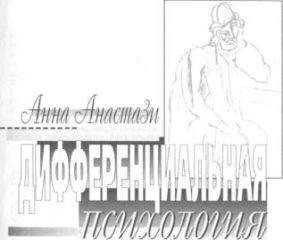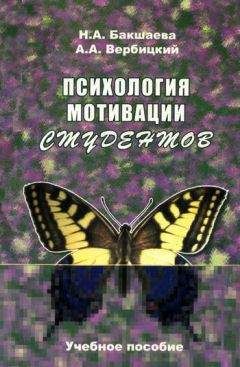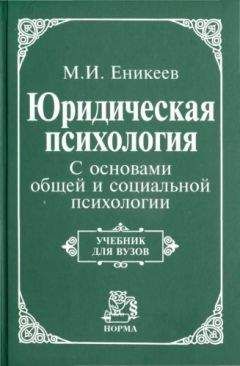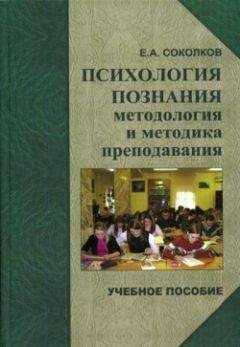Анна Анастази - Дифференциальная психология. Индивидуальные и групповые различия в поведении

Скачивание начинается... Если скачивание не началось автоматически, пожалуйста нажмите на эту ссылку.
Жалоба
Напишите нам, и мы в срочном порядке примем меры.
Описание книги "Дифференциальная психология. Индивидуальные и групповые различия в поведении"
Описание и краткое содержание "Дифференциальная психология. Индивидуальные и групповые различия в поведении" читать бесплатно онлайн.
Данный фундаментальный труд Анны Анастази зарекомендовал себя как один из лучших классических учебников по дифференциальной психологии мирового уровня, со знакомства с которым должен начинать любой студент, изучающий эту дисциплину. В учебнике в доступной и увлекательной форме рассматриваются проблемы индивидуальных различий человека как отдельного индивида и как представителя той или иной группы, исследуются причины и механизмы его поведения.
Рекомендуется в качестве учебного пособия для студентов, изучающих психологию человека и группы, а также для всех, кто интересуется данной тематикой.
Исследования усыновленных детей показывают, что в целом такие дети показывают лучшие результаты, чем можно было ожидать, учитывая их семейное происхождение. Есть основания полагать, что дети, попавшие в лучшие приемные семьи, стали показывать более высокие результаты по сравнению с теми, для которых в приемных семьях оказались не столь благоприятные условия. Имеющиеся данные бывает трудно интерпретировать вследствие селективности усыновления и существующих требований к приемным семьям, а также трудностей измерения тех аспектов семейного окружения, которые наиболее сильно влияют на развитие детей, недостаточности информации о биологических родителях усыновленных детей и других методологических трудностей. Дети, воспитывавшиеся в детских домах, по своему интеллектуальному и эмоциональному развитию находятся в тенденции ниже детей, воспитывавшихся в семейном окружении, при этом у первых особенно страдает развитие речи и социальное развитие. Главной причиной этих отличий является то, что типично детдомовское окружение отличается от типично семейного окружения частотой и характером контактов со взрослыми.
БИБЛИОГРАФИЯ1. Allen, G., and Kallmann, F. J. Frequency and types of mental retardation in
twins. Amer. J. hum. Genet., 1955, 7, 15–20.
2. Barnicot, N. A., Harris, H., and KaImus,H. Taste thresholds of further
eighteen compounds and their correlation with P. Т. С Thresholds. Ann. Eugen., 1951, 16, 119–128.
3. Blatz, W. E. The five sisters. N. Y.: Morrow, 1938.
4. Blatz, W. E., et al. Collected studies on the Dionne quintuplets. Univer.
Toronto Stud. Child Develpm., 1937.
5. Blewett, D. B. An experimental study of the inheritance of intelligence. /.
ment. Sci., 1954, 100, 922–933.
6. Bodman, F., MacKinlay, Margaret, and Sykes, Kathleen. The social
adaptation of institution children. Lancet, 1950, 258, 173–176.
7. Book, J. A. A genetic and neuropsychiatry investigation of a North-Swedish
population, with special regard to schizophrenia and mental deficiency. Acta genet. Statist. Med., 1953, 4, 1 — 100.
8. Bracken, H. V. Mutual intimacy in twins: types of social structure in pairs of
identical and fraternal twins. Char. And Person., 1934, 2, 293–309.
9. Brodbeck, A. J., and Irwin, О. С The speech behavior of infants without
families. Child Develpm., 1946, 17, 145–156.
10. Brody, D. Twin resemblances in mechanical ability, with reference to the
effects of practice on performance. Child Develpm., 1937, 8, 207–216.
11. Burks, Barbara S. The relative influence of nature and nurture upon mental
development; a comparative study of foster parent-foster child resemblance and true parent-true child resemblance. 2?h Yearb., Nat. Soc. Stud. Educ, 1928, Part I, 219–316.
12. Burks, Barbara S. A study of identical twins reared apart under differing
types of family relationships. In Q. VcNemar and Maud A. Merrill (Eds.), Studies in personality. N. Y.: VcGraw-Hill, 1942. Ch. 3.
13. Burlingame, Mildred, and Stone, С. Р. Family resemblance in maze-
learning ability in white rats. 2?h Yearb., Nat. Soc. Stud. Educ, 1928, Part I, 89–99.
14. Byrns, Ruth, and Healy, J. The intelligence of twins. /. genet. Psychol.,
1936, 49, 474–478.
15. Carter, H. D. Ten years on research on twins: contributions to the
naturenurture problem. 39h Yearb., Nat. Soc. Stud. Educ, 1940, Part I, 235–255.
16. Cattell, R. В., Blewett, D. В., and Beloff, J. R. The inheritance of personality.
Amer. J. hum. Genet., 1955, 7, 122–146.
17. Cattell, R. В., Stice, G. F., and Kristy, N. F. A first approximation to
naturenurture ratios for eieven primary personality factors in objective tests. /. abnorm. Soc. Psychol., 1957, 54, 143–159.
18. Cohen, J., and Ogdon, D. P. Taste blindness to phenyl-thio-carbamide
and related compounds. Psychol. Bull., 1949, 46, 490–498.
19. Conrad, H. S., and Jones, H. E. A second study of familial resemblance in
intelligence: environmental and genetic implications of parent-child and sibling correlations in the total sample. 39'' Yearb., Nat. Soc. Educ, 1940, Part II, 97-141.
20. Cotterman, С W., and Snyder, L. H. Tests of simple Mendelian inheritance
in randomly collected data of one and two generations. J. Amer. Stat. Assoc, 1939, 34, 511–523.
21. Crook, M. N. Intra-family relationships in personality test performance.
Psychol. Rec, 1937, 1, 479–502.
22. Danielson, F. PL, and Davenport, С. В. The Hill Folk. Cold Spring Harbor,
N. Y.: Eugenics Record Office (Memoir No. 1), 1912.
23. Davis, Edith A. The development of linguistic skill in twins, singleton
with siblings, and only children from age five to ten years. Univer. Minn., Inst. Child Welf., Monogr., 1937, No. 14
24. Day, Ella J. The development of linguistic in twins. Child Develpm., 1932,
3, 179–199, 298–316.
25. Dugdale, R. L. The Jukes: a study in crime, pauperism, disease, and heredity. N.
Y.: Putnam, 1877.
26. Estabrook, A. N. The Jukes in 1915. Washington: Carnegie Institution,
1916.
27. Estabrook, A. H., and Davenport, С. В. The Nam Family. Cold Spring
Harbor, N. Y.: Eugenics Record Office (Memoir No. 2), 1912.
28. Eysenck, H. J., and Prell, D. B. The inheritance of neuroticism: an
experimental study. /. ment. Sci., 1951, 97, 441–465.
29. Fischer, Liselotte K. Hospitalism in six-month-old infants. Amer. J-
Orthopsychiat., 1952, 22, 522–533.
30. Fisher, Sarah C. Relationships in attitudes, opinions, and values among
family members. Berkeley, Calif: Univer. California Press, 1948.
31. Fisichelli, Regina M. An experimental study of the prelinguistic speech
development of institutionalized infants. Unpublished doctoral dissertation, Fordham Univer., 1950.
32. Freeman, F. N., Holzinger, K. J., and Mitchell, В. С The influence of
environment on the intelligence, school achievement, and conduct of foster children. 2?h Yearb., Nat. Soc. Stud. Educ, 1928, Part I, 103–217.
33. Galton, F. Heredilary genius: an inquiry into its laws and consequences.
London: Macmillan, 1869.
34. Galton, F. Inquiries into human faculty and its development. London:
Macmillan, 1883.
35. Galton, F. Natural inheritance. London: Macmillan, 1889.
36. Gardner, I. C., and Newman, H. H. Mental and physical tests of identical
twins reared apart. /. Hered., 1940, 31, 119–126.
37. Gardner, I. C., and Newman, H. H. Studies of quadruplets. VI. The only
living one-egg quadruplets. /. Hered., 1943, 34, 259–263.
38. Gedda, L., and Neroni, Lydia. Reazioni posturali e mimiche di 56 coppie
di gemelli alia proiezione di film umoristici ed anziogeni. Acta genet, med. gemellolog., 1955, 4, 15–31.
39. Gedda, L., Bianchi, A., and Bianchi-Neroni, Lydia. Voce dei gemelli: I.
Prova di identificazione intrageminale della voce in 104 coppie. Acta genet. Med. Gemellolog., 1955, 4, 121–130.
40. Gilliand, A. R. Environmental influences on infant intelligence test scores,
Harv. Educ. Rev., 1949, 19, 142–146.
41. Godderd, H. H. The Kallikakfamily: a study in the heredity of feeblemindedness.
N. Y.: Macmillan, 1912. 42: Goldfarb, W. Emotional and intellectual consequences of psychologic deprivation in infancy: a revaluation. In P. H. Hoch and J. Zubin (Eds.), Psychopathology of childhood. N. Y.: Grune & Stratton, 1955. Pp. 105–119.
43. Hildreth, Gertrude H. The resemblance of siblings in intelligence and
achievement. Teach. Coll. Contr. Educ, 1925, No. 186.
44. Hirsch, N. D. M. Twins: heredity and environment. Cambridge: Harvard
Univer. Press, 1930.
45. Holmes, S. J. Nature versus nurture in the development of the mind. Sci.
Mon., 1930, 31, 245–252.
46. Holzinger, K. J. Reply to special review of "Twins". Psychol. Bull., 1938,
35, 436–444.
47. Honzik, Marjorie P. Developmental studies of parent-child resemblance
in intelligence. Child Develpm., 1957, 28, 215–228.
48. Howard, Ruth W. The language development of a group of triplets. J.
genet. Psychol., 1934, 69, 181–188.
49. Husen, T. Uber die Begabung von Zwillingen. Psychol. Beitr., 1953, 1,
137-145.
50. Jones, D. С, and Carr-Saunders, A. M. The relation between intelligence
and social status among orphan children. Brit. J. Psychol., 1926— 27, 17, 343–364.
51. Jones, H. E. Homogamy in intellectual abilities. Amer. J. Sociol., 1929—
30, 35, 369–382.
52. Jones, H. E. Perceived differences among twins. Eugen. Quart., 1955, 2,
98-102.
53. Jones, H. E., and Wilson, P. T. Reputation differences in like-sex twins. /.
exp. Educ, 1932-33, 1, 86–91.
54. Kalhorn, J. Mental test performance of siblings. Amer. Psychologist, 1948,
3, 265.
55. Kallmann, F. J. The genetics of psychoses: an analysis of 1232 twin index
families. Amer. J. hum. Genet., 1950, 2, 385–390.
56. Kallmann, F. J. Twin and sibship study of overt male homosexuality. Amer.
J. hum. Genet., 1952, 4, 136–146.
57. Kallmann, F. J. Heredity in health and mental disorder: principles of psychiatric
genetics in the light of comparative twin studies. N. J.: Norton, 1953.
58. Kallmann, F. J. Genetic principles in manic-depressive psychosis. In P. H.
Hoch and J. Zubin (Eds.), Depression. N. Y.: Grune & Stratton, 1954. Pp. 1-24.
59. Kallmann, F. J., et al. Suicide in twins and only children. Amer. J. hum.
Genet., 1949, 1, 113–126.
60. Kallmann, F. J., and Baroff, G. S. Abnormalities of behavior. Ann. Rev.
Psychol., 1955, 6, 297–326.
61. Kallmann, F. J., and Roth, B. Genetic aspects of preadolescent
schizophrenia. Amer. J. Psychiat., 1956, 112, 599–606.
62. Kelly, E. L. Consistency of the adult personality. Amer. Psychologist, 1955,
10, 659–681.
63. Koch, Helen L. Attitudes of young children toward their peers as related
to certain characteristics of their siblings. Psychol. Monogr., 1956, 70, No. 19, 1-41.
64. Lawrence, E. M. An investigation into the relation between intelligence
and inheritance. Brit. J. Psychol., Monogr. Suppl., 1931, 5, No. 16.
65. Leahy, Alice M. Nature-nurture and intelligence. Genet. Psychol. Monogr.,
1935, 17, 236–308.
66. Levy, R. J. Effects of institutional versus boarding home care on a group of
infants. J. Pers., 1947, 15, 233–241.
67. Mark, J. C. The attitudes of the mothers of male schizophrenics toward
child behavior. /. abnorm. Soc. Psychol, 1953, 48, 185–189.
68. May, M. A., and Hartshorne, H. Sibling resemblance in deception. 2?h
Yearb., Nat. Soc. Stud. Educ, 1928, Part II, 161–177.
69. McCarthy, Dorothea, Language development in children. In L.
Carmichael (Ed.), Manual of child psychology (2nd Ed.). N Y 1954. Pp. 492–630.
70. McNemar, Q. Twin resemblances in motor skills, and the effect of practice
thereon. / genet. Psychol., 1933, 42, 70–99.
71. McNemar, Q. Special review: Newman, Freeman and Holzingeer's Twins:
a study of heredity and environment. Psychol. Bull., 1938, 35 237–249.
72. VcNemar, Q. A critical examination of the University of Iowa studies os
environmental influences upon the IQ. Psychol. Bull., 1940, 37, 63–92.
73. McNemar, Q. The revision of the Stanford-Binet Scale: an analysis of the
standardization data. Boston: Houghton Mifflin, 1942.
74. Misbach, L., and Stromberg, R. N. Non-separation as a source of
dissimilarities between monozygotic twins: a case report. /. genet. Psychol., 1941, 59, 249–257.
75. Moore, J. K. Speech content of selected groups of orphanage and
nonorphanage preschool children. /. exp. Educ, 1947', 16, 122–133.
76. Muller, H. J. Mental traits and heredity. J. Hered., 1925, 16, 433–448.
77. Newman, H. H., Freeman, F. N., and Holzinger, K. J. Twins: a study of
heredity and environment. Chicago: Univer. Chicago Press, 1937.
Подписывайтесь на наши страницы в социальных сетях.
Будьте в курсе последних книжных новинок, комментируйте, обсуждайте. Мы ждём Вас!
Похожие книги на "Дифференциальная психология. Индивидуальные и групповые различия в поведении"
Книги похожие на "Дифференциальная психология. Индивидуальные и групповые различия в поведении" читать онлайн или скачать бесплатно полные версии.
Мы рекомендуем Вам зарегистрироваться либо войти на сайт под своим именем.
Отзывы о "Анна Анастази - Дифференциальная психология. Индивидуальные и групповые различия в поведении"
Отзывы читателей о книге "Дифференциальная психология. Индивидуальные и групповые различия в поведении", комментарии и мнения людей о произведении.

















